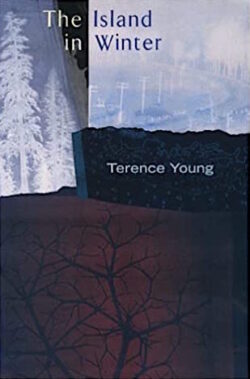1052 Covid & the Zoom engine of poetry
INTERVIEW: Terence Young with Nathaniel G. Moore
*

Terence Young lives in Victoria, where he has recently retired from teaching English and creative writing at St. Michaels University School. He is a co-founder of The Claremont Review (1992), an international literary journal for young writers that has, after 25 years of service to the writing community, sadly closed its doors. His first book of poetry, The Island in Winter (Signal Editions, 1999), was shortlisted for the Governor General’s Award and the Gerald Lampert Award. Since then, he has published several books: a collection of stories, Rhymes With Useless (Raincoast, 2000), which was one of two runners-up for the annual Danuta Gleed award; a novel, After Goodlake’s, which received the City of Victoria Butler Book Prize in 2005; and a second collection of poetry, Moving Day (Signature Editions, 2006), which was nominated for both the Dorothy Livesay Poetry Prize and The City of Victoria Butler Book Prize for 2006. In 2008, he was awarded the Prime Minister’s Award for Teaching Excellence, an honour shared with fifteen other teachers from across Canada that year. A second collection of fiction, The End of the Ice Age, was released from Biblioasis Press in the spring of 2010. He recently received a National Magazine Award (Silver) for his poem “The Bear.” Smithereens, his latest poetry collection, is now available from Harbour Publishing – Nathaniel G. Moore
*
 Nathaniel Moore: Your third book of poetry, Smithereens has garnered much attention from Canadian and International poets, including past winners of the Griffin Prize. What appears to be the consensus from this initial buzz is, your new poetry book is an engagement with humanity in time at all its stages, its delicate and complicated relationship with the physical world. As George McWhirter says, “Young attempts less to reconstruct a life, or lives, well lived than to enact a kind of verbal psychometry.” Instead of simply asking you what your new book is about, can you tell me, for reasons of personal curiosity, what was the first and last poem you wrote in this book?
Nathaniel Moore: Your third book of poetry, Smithereens has garnered much attention from Canadian and International poets, including past winners of the Griffin Prize. What appears to be the consensus from this initial buzz is, your new poetry book is an engagement with humanity in time at all its stages, its delicate and complicated relationship with the physical world. As George McWhirter says, “Young attempts less to reconstruct a life, or lives, well lived than to enact a kind of verbal psychometry.” Instead of simply asking you what your new book is about, can you tell me, for reasons of personal curiosity, what was the first and last poem you wrote in this book?

Terence Young: This book has been a while coming – my last collection came out in 2006 — so it’s hard to say which of the poems in Smithereens is the oldest, but if I had to guess I think it might be “Weight,” a poem that arose out my days working in a nickel mine in Thompson, Manitoba. The most recent poem is probably “Gathering,” a response to a recent visitation we had at our cabin, when a couple of dozen vultures descended into the woods not far away.
Nathaniel Moore: Let’s give the reader a sneak preview of the book with the Manitoban poem you mention:
Weight
Let us recall people we have carried
on our backs, like the girl this boy is hefting
to prove he can, outside our local at closing,
on a mid-November night thick with rain,
both of them astonished by arms, thighs,
to be so alive beneath their winter coats.
Or the waitress I carried one December,
across a snowy field in Thompson, Manitoba,
sometime cook, too, in a coffee shop,
generous with her portions of pancakes and
eggs, lonely in a town of lonely people,
out on her break that Christmas day, walking
under the frozen northern sun in parka,
thin shoes, me in boots and useless jeans,
the snow deep enough to invite such
a game, wondering as I did with almost
every sympathetic face back then, was
this someone to love, that whole mystery.
But to get back to those kids outside the
pub, as my wife and I walk by, the boy,
his knees locked against buckling, the girl
turning her head to smile at a cell phone,
its flash lighting up the street, his face
and behind him hers, stunned, joyous,
bright echo of the photo someone took
of the waitress, nameless now, and me,
black and white study in self-consciousness,
our two shadows crisp against the snow.
Nathaniel Moore: Thanks, Terence. Every city and town in Canada has their own poetry community. From Moncton to Ottawa, Edmonton, to the Sunshine Coast in British Columbia, to Yellowknife in the Northwest Territories. For those not as familiar with poets in British Columbia, what would you suggest is the best way to get a crash course in what the poets in your province are doing?
Terence Young: There are few ways to find out about BC writers in general. The first is to pick up a copy of BC Bookworld or have a look at it online. The Poetry section at The Ormsby Review also provides a quick access. After that, I’d suggest checking out The Federation of BC Writers. As a member, I find them extremely helpful with notifications about readings and literary news. They also have an extremely informative newsletter. In these times of Covid, it’s a little difficult to get out to readings, and festivals are currently online for the most part, but when they do come back, it’s always rewarding to attend The Vancouver Writers Festival, The Whistler Writers Festival, The Surrey International Writers’ Conference, and here in Victoria, The Victoria Festival of Authors.


Nathaniel Moore: What are some poetry books you have in any given pile, bookshelf, or stack in your office or home?
Terence Young: Recent additions include Outlasting the Weather by Patrick Friesen, The Essential Derk Wynand; and some that seem to pop up in the pile from time to time are Motherland, Fatherland, Homelandsexuals by Patricia Lockwood, Crush by Richard Siken, and Citizen by Claudia Rankine.
Nathaniel Moore: Can you talk about the title — it’s a beautiful word on the page — a word we don’t see that often anymore. The delicate image on the cover seems to act in conflict with elements of what we associate with the word smithereens, yet, when you break it down, the wind comes, blows the dandelion into literally tiny pieces. Any thoughts on this design element?
Terence Young: Smithereens is one of those wonderful words people generally discover as a kid. It has such momentum, such energy. It’s actually the last word in the poem “Easter Train,” from the collection, a moment when a young boy stops on a boulevard to pick the dandelions that have gone to seed and blow “to smithereens each and every one.” I love how Anna at Harbour pulled this one detail from the book to serve as the graphic complement to the title.

Nathaniel Moore: Poetry and performance almost go hand in hand. With our planet’s current restrictions being in place for over a year now, how have you observed the way poetry is being presented, and how has this concerned or prepared you for the release of Smithereens?
Terence Young: I’m actually fairly impressed by the way that writers and publishers have adapted to meet the challenge. Having attended several Zoom launches and readings over the past year, I am surprised to see how comfortable I am with the medium. So many more people can participate — time zones notwithstanding — and the audience can adjust the volume at will if they need to: sometimes a reader’s voice gets lost in the ceiling of some venues and there are often other sounds competing, like the steam of an espresso maker. Even better, viewers are not obliged to turn on their webcam and can watch the reading in their pyjamas if they like or take a quick trip to open another beer.

Live readings will always be preferable, of course, but I’m wondering if these virtual readings might not become a fixture on the literary scene, given their audience reach and the option they provide not to have to drive any distance — you can see from my response that I have become one of Covid’s converts to introversion, which is another topic entirely.
Nathaniel Moore: What do you hope readers will take away from reading Smithereens?
Terence Young: As with any book of poetry, there will be poems that have no relevance for certain readers and others that will not appeal for reasons of style or content; but I hope that most readers will find some common ground in the book, as well as some language that meets with their approval and maybe even delights them.
*
Nathaniel G. Moore is the author of seven books including Jettison (Anvil Press, 2013) Savage 1986-2011 (Anvil, 2013), winner of the 2014 Relit Award for Best Novel. His book reviews have appeared in the Georgia Straight, the Globe and Mail, and Canadian Literature, and he reviewed Scarred: The True Story of How I Escaped NXIVM, the Cult that Bound My Life, by Sarah Edmondson, for The Ormsby Review. He has also interviewed Curtis LeBlanc and Tom Wayman for The Ormsby Review. His new collection of essays, Honorarium, was released by Palimpsest Press (Windsor, ON) in Spring, 2021. Formerly of Pender Harbour, Nathaniel now lives and works in in Fredericton, New Brunswick.
*
The Ormsby Review. More Books. More Reviews. More Often.
Publisher and Editor: Richard Mackie
The Ormsby Review is a journal service for in-depth coverage of B.C. books and authors. The Advisory Board consists of Jean Barman, Wade Davis, Robin Fisher, Cole Harris, Hugh Johnston, Patricia Roy, David Stouck, Maria Tippett, and Graeme Wynn. Scholarly Patron: SFU Graduate Liberal Studies. Honorary Patron: Yosef Wosk. Provincial Government Patron since September 2018: Creative BC
“Only connect.” – E.M. Forster